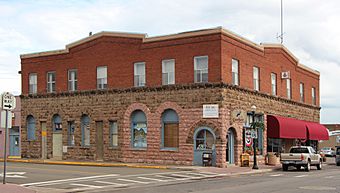Pollock Building facts for kids
Quick facts for kids |
|
|
Pollock Building
|
|
|
U.S. Historic district
Contributing property |
|
 |
The Pollock Building is an old and important building in Williams, Arizona. People also call it the Williams Masonic Lodge. It's part of the Williams Historic Business District, which is a special area listed on the National Register of Historic Places. This means it's a very important place in history!
The building shows two different styles of architecture. The first part, built in 1901, used a style called Romanesque from the late 1800s. It was made mostly of local stone to protect it from fires. This part of the building was a bank and also had several shops.
Later, in 1927, a group called the Masons bought the building. They added a second floor made of brick. The building is still used today. It helps us see how different building styles have shaped Northern Arizona over time.
History of the Pollock Building
The Pollock Building was built in 1901 by a man named T. E. Pollock. This happened after a big fire destroyed much of Williams, Arizona, that same year. Pollock was an important businessman in Northern Arizona. He made this building the home for his Arizona Central Bank.
Besides the bank, the Pollock Building also had other businesses. These included Canall's Arizona Telephone and Telegraph Company, the Williams News newspaper, and Perkins "Dime" Store. After 1917, Pollock moved his bank to a new building. Other businesses also started to leave.
By 1927, when the Masons bought the building, it was mostly empty. The Masonic group raised money and started new businesses. This helped them begin building a second story made of brick in 1928. This new floor was for their lodge meetings. After finishing the second story, the Masons fixed up the first floor. They divided it into three separate stores.
How the Building Was Built
T. E. Pollock built the original part of the building using local stone. This type of stone was used in many buildings in Flagstaff and Williams, Arizona. The main reason for using so much stone was to protect against fires. Many cities in Northern Arizona had terrible fires that often destroyed entire towns. But with stone, this danger became much less of a worry.
Like many buildings from that time, it showed a Romanesque art style. This means it had fancy, arched doorways and round-headed windows along its sides. The bottom floor was built with local stone because there was a lot of it nearby.
The second story was added in 1927. It was made of much lighter brick. This was done to make sure the building stayed strong and stable. This upper part was only for the Williams Masonic Lodge. The bottom floor continued to be a place for businesses.
Gallery




